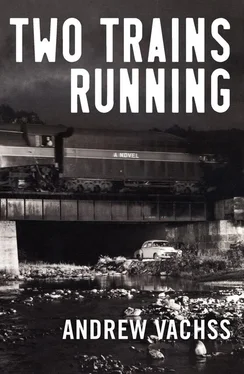One man’s hand was already under his lapel as Dett’s.45 cracked. The shot caught him in the center of his chest, dropping him instantly. Without shifting his feet, Dett ratcheted his shoulders a few notches and cranked off another round, nailing the other man in the stomach.
Dett bent forward and carefully shot each man between the eyes. He turned and walked unhurriedly past the dead bodies toward his car, the.45 dangling at his side.
No lights went on. No sirens broke the night.
Dett slipped his pistol back into its holster and kept walking, moving quickly through the slow-motion movie reel unfurling all around him.
The ignition key was already slotted in the Impala, the protruding portion wrapped in black electrical tape so it wouldn’t catch the eye of any casual passerby. The door was unlocked. It only took Dett a long heartbeat to get in, start the engine, and smoothly pull away.
Dett drove to the pawnshop. But instead of parking in front of the building, he pulled around to the side, and opened the padlock to the chain-linked lot, using a key the pawnbroker had insisted on giving him.
When he drove out a few minutes later, Dett was behind the wheel of the Ford, dressed in laborer’s clothes. His hands reeked faintly of gasoline. He was unarmed.
1959 October 04 Sunday 03:09
“What did he say? Exactly,” Dioguardi demanded.
“He said, ‘Tell your boss, the next package I deliver, I won’t use the mail.’ Then he hung up. Fucking cocksucking-”
“He didn’t ask for anyone, Vito? Like last time?”
“No, boss. It was just what I told you, word for word.”
“Would you know the voice if you heard it again?”
“I… Maybe, I don’t know, Mr. D. It was a white guy. Not a kid, but not too old, either.”
“He didn’t have any kind of an accent?”
“No. It was like… it was like talking to a machine. What do we do, Mr. D.?”
“When he calls again, you tell him I want to talk.”
“Maybe he won’t-”
“Yeah, he will,” Dioguardi said, grimly confident.
1959 October 04 Sunday 03:23
Moonlight transformed the gleaming aluminum skin of the Air-stream trailer into a shimmering, eye-tricking image, like a metallic mushroom growing in a dense forest. The trailer was mortally wounded-first ripped and torn beyond repair in a head-on collision with a hell-bound semi, later stripped of anything that could be turned into cash, and finally left to rot in a far corner of the junkyard. A red dot glowed from somewhere inside what was once its doorway.
“It’s almost half past, Omar,” Kendall said to Rufus.
“I know what time it is, brother.”
“They was never so late before.”
“You got someplace to be, K.?”
“Yeah, man. Always. Right here, with you, wherever you is. All I’m saying-”
“That’s them,” Darryl interrupted, as jaundiced headlight beams cut the night.
A dark-gray panel truck turned into the entrance to the junkyard. On its side were the words “Acme Transfer Company” in red, flowing above a painting of a deliveryman wheeling a file cabinet on a hand truck, the sleeves of his shirt rolled up to display bulging cartoon biceps.
The truck did a slow-speed slalom through the piled-up car corpses until it came to a cleared area where the remains of the trailer sat.
“Why it always got to be two of them?” Kendall whispered to Rufus.
“There’s more than two of us,” Rufus answered. “They’re the ones walking into the lions’ den.”
“Don’t ever feel like that to me, brother. Those some spooky motherfuckers.”
Rufus was already on his feet, moving toward the truck, which had come to a gentle stop.
A man emerged from the passenger seat, dropping lightly to the ground. He was dressed in a black leather jacket over a white turtleneck jersey and blue jeans.
Like he bought that whole outfit an hour ago, Rufus thought to himself. And look at those shoes-they’re made for a suit. “You’re late,” he said aloud. “I wasn’t sure you’d be coming.”
“We had to take a detour,” the man said. He was a couple of inches shorter than Rufus, with a face older than his trim physique.
“I’ve got your money,” Rufus said.
“And we’ve got your goods,” the man replied, twitching his mouth.
As they spoke, the driver climbed out of the truck, walked around to the back, and opened the doors.
Mutt and Jeff, Rufus thought, noting the driver’s height. But they shop at the same store.
The shorter man made a “Welcome to my establishment” gesture with one hand, indicating two rows of neatly stacked wooden crates.
“I don’t see any-” Rufus said.
“Everything’s there,” the man cut him off. “You’ve got four to a crate, so that’s twenty-four total. Behind, you’ve got extra thirty-round magazines, plus five thousand rounds.”
“We said fifty.”
“You said fifty M1s,” the man corrected Rufus. “What you’ve got here, my friend, is two dozen M2s. They may be Winchesters, but they’re not the kind you could walk into a gun shop and buy, not ordnance like this. It’s all military, right out of the armory. Brand-new and perfect. An operation like we run, if you want to keep doing it, you take the opportunities as they’re offered. Twenty-four is what we could take out safely. So we know we can always go back.”
“The price-”
“The price is the same,” the man said. “And it’s cheap at that. The M2s have a selective fire switch. You know what that means?”
“Yeah, I know what it means. But two dozen machine guns still means only two dozen men can hold them. My buyer wanted fifty, like I said.”
“This load is what we have, friend. You want it, or not?”
“I want it. But not for no-”
“We didn’t drive out here to bargain, friend,” the shorter man said. “If you don’t want to take the package, we know other people who will. The only reason we even bothered to come all the way out here was because you’ve been such a good customer.”
“I don’t see why we can’t… adjust the price,” Rufus said, resentfully.
“We took the same risk for twenty-four as we would have for fifty,” the man said, his tone indicating he considered his position very reasonable. “And we’d spend just as much time in prison if we were caught. We have expenses. People to pay, all along the route. Nobody we had to pay wanted to hear about any ‘adjustment.’ Look, like I said, you’re a good customer. We’ll make it up to you on the next shipment. What do you say?”
“I’ll get the money,” Rufus said.
“Good. We’ll start unloading, then.”
1959 October 04 Sunday 04:19
“I still think it was stupid, Fred,” the driver of the panel truck said to the man next to him. They were back on the interstate, twenty miles from the drop-off point, heading west. “What if they had refused the load?”
“You don’t understand those people, Milt,” the man in the passenger seat said. “They expect us to try and change the deal, from time to time. If we didn’t, they’d get suspicious.”
“So what if they did? So long as they take the guns, what difference does it make?”
“The difference it makes is, maybe, the difference in our careers, partner.”
“I don’t get what you’re saying, Fred. We were told to-”
“What I’m saying is, this whole thing started as an assignment. The Bureau needs to know who’s buying guns, and the best way to know that is for us to be in the gunrunning business.”
“Right. So?”
“So knowing who’s buying guns isn’t the same thing as knowing what they’re going to do with them.”
“You think they’re going to just tell us?”
“Well, they did kind of tell us, Milt, if you think about it. That is, if you count that fairy story about some nigger in a junkyard who’s an international arms trafficker,” the shorter man said, scornfully. “Still, up to now, they haven’t asked us for anything except what we’re supposed to be selling. Guns. Now, we know something from the kind of guns they buy, don’t we? Sure!” the shorter man said, answering his own question, as was his habit. “But think what we might learn if they got the idea we could get inside an armory somewhere. Who knows how far they might go?”
Читать дальше












